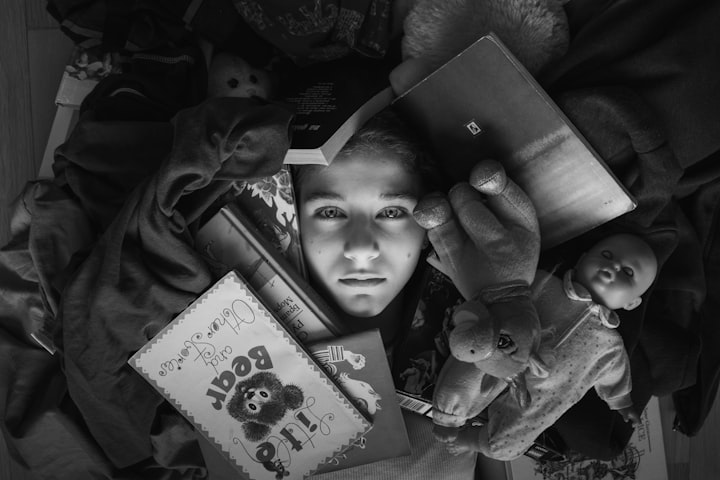Obsessive Compulsive Disorder
It's Okay Not To Be Okay

This piece is about mental health awareness and the struggle many people face every single day. It is not meant as a diagnostic tool or to give any medical advice whatsoever. Every individual has their own story and their own treatment plan, so even if you see part of yourself in this piece, it's vital that you seek the help of a trained professional. It IS okay not to be okay.
This article is number 7 in a 20 - piece collaboration on a wide variety of Mental Health issues and disorders. If you would like to learn more about this project as a whole, please read our prologue. All of the authors involved in this collaboration are passionate about raising awareness on these very sensitive subjects and we hope that our combined effort will help rid society of the stigma that surrounds Mental Health Disorders. I will include some links to the other pieces at the end of this contribution. I strongly encourage you to read as many as you can and please feel free to share anything that resonates with you to help us spread this very important message!
Mental illness does not confine itself to people of a specific race, gender, or sexual orientation. Anyone can suffer from it, and there's a very good chance that if you don't personally have one, or even several, mental disorders you most likely know someone that does.
There's no need to suffer in silence!
💞💞💞💞💞💞💞💞💞💞💞💞
OCD - Obsessive Compulsive Disorder
It seems like OCD has become the catchphrase of the 21st century. It is commonly misrepresented in movies and on tv, and since the pandemic, everyone seems to think they have it. At least many people assume that people who have OCD have a leg up in the sanitation department during the pandemic.
Most people assume that someone suffering from OCD is a clean freak. Although this may be the case, it might not even come into play. There are several different subtypes of OCD and most of them have nothing to do with cleaning at all.
So what exactly is OCD?
Obsessions are unwanted, recurring thoughts or urges over which a person has no control. They cause a great deal of discomfort, fear, anxiety, even panic.
These thoughts are not confined to a fear of contamination, as is commonly represented in discussing OCD. Contamination OCD is only one of several subtypes of this disorder.
Compulsions are activities that a person engages in to relieve the discomfort of these obsessive thoughts. These activities or rituals are typically not something the person wants to do, they feel it is the only way they can temporarily stop the obsessive thoughts.
A Disorder is diagnosed when symptoms interfere with a person's ability to enjoy normal daily activities for a period of more than 6 months.
---------------------------------------------------------------------
Obsessive Compulsive Disorder is not to be confused with Obsessive Compulsive Personility Disorder (OCPD). Although there are some similarities between the two, people who have OCPD believe that their compulsions are the right thing to do and that there is no alternative. They strive to have or do things a certain way. People with OCD know that their obsessions or compulsions may not even make sense, they have no control over them and they are not things they want to have to deal with.
-----------------------------------------------------------------------
Psychological disorders are often broken down into subtypes. With OCD these subtypes are based on the theme of the obsessive thought. As you read through the following information, please keep in mind that a person suffering from a particular subtype of OCD finds these thoughts uncomfortable, distressing and often disturbing. Having Harm OCD does NOT make a person a danger to society! They use other behaviors to try to STOP the disturbing thoughts.
Subtypes of OCD:
Contamination OCD:
This subtype is what most often comes to mind when the topic of OCD comes up. It is the most stereotypical type.
Contamination OCD is the fear of getting sick or making someone else sick after coming in contact with a virus or bacteria. Frequent handwashing and compulsive cleaning/sanitizing are the most common symptoms. However, a person suffering from Contamination OCD may be afraid of being in public, going to the doctor or even being around children.
Just Right OCD:
This is another subtype that you may be familiar with, as it is commonly represented in entertainment.
Just Right OCD isn't as much a fear, as extreme discomfort from things not being perfect. A person with Just Right OCD will organize and reorganize things in their environment, until they are confident that it is 'just right', they may agonize over the wording of written work, or repeat actions over and over until they feel they've done it perfectly.
Harm OCD:
Having an occasional thought or impulse to harm ourselves or others is something everyone experiences. These thoughts are easy for neuro-typical people to dismiss.
Frequent thoughts like this should never be taken lightly.
Harm OCD is not to be confused with sociopathy or psychopathy. It is actually quite the opposite. A person with Harm OCD is greatly disturbed by their thoughts of causing harm and will go to great lengths to prevent it.
A person with Harm OCD may think of causing harm intentionally or by accident. They go to great lengths to avoid it and may seek reassurance from others to confirm that they would not actually do it. They may choose not to leave their homes because of this fear and they will come up with other rituals so as to prevent it.
Pedophilia OCD:
This NOT to be confused with pedophilia! The obsession doesn't revolve around a desire to perform sexual acts with children. A person suffering from this subtype is obsessed by the potential to even have the desire. They may be afraid that they have already molested a child and just not remember. They are overcome by the fear of harming a child.
They may compulsively read stories about real pedophiles to find reassurance that they are not child molesters. They will likely try to avoid children altogether and they will most certainly beat themselves up over these thoughts.
Relationship OCD:
A person with Relationship OCD is consumed with the uncertainty of their relationships. They worry that their relationship will not stand the test of time or that they are with the wrong person. As you can imagine, the thoughts and fears that are intertwined with Relationship OCD can be just as multi-faceted and complicated as relationships themselves tend to be.
They will seek constant reassurance from their partners and others that their relationships are healthy and happy. They may take online quizzes or compare their relationships with people around them.
Scrupulosity OCD:
This subtype was first referred to as Religious OCD however, it has been expanded to include secular moral and ethical obsessions. People suffering from these types of obsessions are concerned that they are not doing things right and that it makes them sinful or 'evil'. If their obsession is religious in nature they fear eternal damnation if they do not perform their religious rituals perfectly.
For example, they may believe that they have to pray a certain way or that if they so much as think about something that does not align with their moral, religious or ethical beliefs they have sinned or done wrong. They are terrified that they might offend God or another person.
Compulsions that spring from these thoughts include excessive prayer, rituals or confession or seeking constant reassurance from others. They may also avoid people, places or activities that they believe will give them opportunity to sin.
These are just a few of the OCD subtypes, there are more. The important thing to note is that for a person with OCD of any subtype the thoughts and resulting compulsive behaviors occur frequently enough to interfere with their ability to lead a normal life. They are accompanied with very extreme levels of anxiety.
If you or someone you love suffers with OCD, you are not alone. There is no need to suffer in silence. There is help and support available for you! There are medications and treatments that have proven helpful in treating OCD. Below are some great resources, but please talk to your doctor as well. They will be able to help you choose the best treatment options and can connect you with local supports.
https://nami.org/About-Mental-Illness/Mental-Health-Conditions/Obsessive-compulsive-Disorder
Please keep your eyes peeled for Colt Henderson's upcoming article on Paranoia!
You can help us raise awareness and break the stigma by sharing any or all of our articles! ~ Thank you!
About the Creator
Analise Dionn
This life began with trauma. Now married, with 2 adult children and raising a grandchild with FASD/PTSD/ADHD. Navigating this very personal journey of healing with ADHD, thriving after a lifetime of abuse... all through the grace of God.






Comments
There are no comments for this story
Be the first to respond and start the conversation.